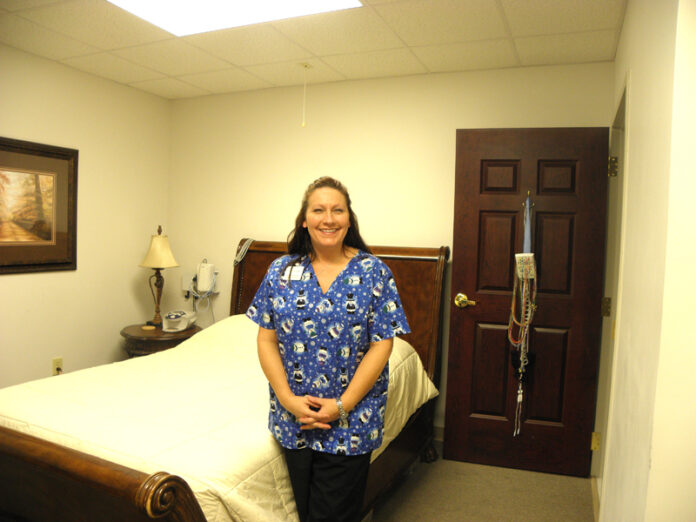
Texas native Raquel Rothe opened SleepEZ Diagnostic Center, the Roanoke region’s only stand-alone sleep diagnostic and treatment facility, in November 2005. She had moved here to marry her husband, Thomas, bringing with her a career in respiratory therapy and experience in clinical sleep studies. She had initially thought of working at one of the region’s hospitals or teaching, but then Thomas found the perfect spot for a sleep center.
Rothe remembers him asking her “how would you like to look at the mountains from your office every day?” The West Main Street location in Salem provided just that view. Inside, the atmosphere is just as restful. Four tastefully decorated bedrooms, featuring queen-sized beds, are soundproofed and contain no alarm clocks.
Rothe’s decision to work for herself was guided by an experience she had years ago in Texas. She recounts the story of a husband and wife who arrived at the hospital-based facility where she worked and taught. Rothe noticed that they both had overnight bags with them, though only the husband – the patient – would be allowed to stay. They told her they had been married 30 years and had never slept apart. The next morning, Rothe noticed that the wife had slept in the parking lot – and she realized the staff probably didn’t get a very good study from the husband.
Thus, spouses, partners and service dogs are welcome at SleepEZ. Rothe’s goal is for patients to feel at home and to maintain their regular sleep routines. In that way she offers a clear alternative to the more clinical settings found in hospital sleep labs. Rothe draws patients from as far away as Galax and Bluefield.
There are 12 staff members: sleep technologists and respiratory practitioners. The facility can operate 24 hours a day, seven days a week if necessary. Rothe explained that daytime patients might be truck drivers, shift workers or people who, for whatever reason, can only sleep during the day.
Because her own staff members work overnight, Rothe is very careful about their own sleep patterns. They use a blue light to help reset their circadian rhythms, or body clocks. She urges them to be in tune with their own body needs and then sets the schedules accordingly.
Patients are typically diagnosed over one or two nights. They can bring spouses or family members along, as well as their own food and beverages. The center’s break room kitchen is stocked with light snacks and offers a view of the mountains. Patients are attached to a “head box,” which monitors such factors as eye movement, snoring, heartbeat, respiration, brain activity and leg movement.
The night’s worth of data plays across monitors in the control room. Each technician will observe no more than two patients at a time. Rothe has the ability to watch patients remotely from her iPad. Yes, there’s an app for that!
Her passion for sleep awareness extends beyond her patients. Rothe blogs about sleep issues and posts on social media sites such as Facebook and Twitter. “If you’re missing out on sleep, you’re missing out on life,” she says. In honor of National Sleep Awareness Week (March 5-11), she offers the following tips:
• Give yourself “permission” to go to bed. Put away the to-do list and make sleep a priority.
• Unwind early in the evening.
• Develop a sleep ritual. Doing the same things each night before bed signals your body to settle down.
• Keep regular hours to maintain your biological clock.
• Create a restful place to sleep, such as a cool, dark room that is free from noise.
• Sleep on a comfortable, supportive mattress and foundation. Don’t sleep on a bed that’s too soft, too hard or too old.
• Exercise regularly, but not within four hours of bedtime.
• Cut down on stimulants, such as caffeine.
• Don’t smoke. Smokers take longer to fall asleep and wake up more often during the night.
• Reduce alcohol intake, especially shortly before bedtime.


Raquel, that was a neat article about what you do. It is also a great invitation to people who need a sleep study.